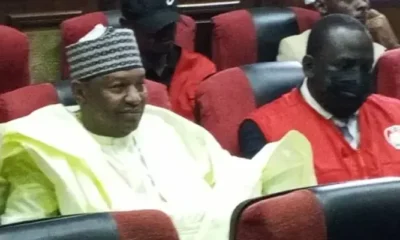News
Preachers Must Submit Sermons For Approval Before Preaching – Governor Umar Bago
The Niger State Government has rolled out a controversial law requiring preachers to submit their sermons for approval before preaching…

The Niger State Government has rolled out a controversial law requiring preachers to submit their sermons for approval before preaching, a move Governor Umar Bago says is aimed at curbing incitement and promoting peace.
The Governor of Niger State, Umar Bago, has defended a new law requiring religious preachers to submit their sermons for approval before delivering them.
Speaking on TVC’s Politics on Sunday, Bago insisted the directive was not a ban on evangelism but a safeguard against messages that could incite violence or disrupt peace.

“I didn’t ban evangelism. For anybody going to sermon on a Friday, he should bring his scriptures for review, and it’s normal. Even in Saudi Arabia, it’s done like that. We cannot say because you have been given the opportunity to be a cleric, you will go out and preach the gospel that is anti-people, anti-government and you think it’s normal,” the governor said.
DON’T MISS: Resident Doctors Call Off Strike, Hand FG Fresh Ultimatum
Bago explained that the initiative would be enforced with support from security agencies, including the DSS, Police, Civil Defence, and the military, as part of wider efforts to prevent indoctrination and hate preaching.
Earlier this month, the Director General of Niger State Religious Affairs, Umar Farooq, announced that all preachers in the state must obtain licences within two months. Clerics would be required to fill forms, undergo screening, and be certified before preaching publicly.
The policy has stirred debate among residents and religious groups. The Christian Association of Nigeria (CAN), Niger State chapter, clarified that the directive does not apply to Christians and said there would be no legal challenge.

In a statement, CAN’s media aide, Daniel Atori, said the directive had been misinterpreted, explaining that the Bureau for Religious Affairs only introduced the “Da’awah Registration Form and Certification Process” to regulate clerics and curb misleading messages.
Similarly, the Bureau for Religious Affairs denied imposing a blanket restriction, stressing that certification was only meant to promote peace and religious tolerance.
“The objective of the exercise is to sensitise the sector, promote religious harmony, unity, and ensure proper religious propagation throughout the state. Furthermore, the committee has been mandated to issue guidelines to all applicants, and any violation of the guidelines may lead to withdrawal of the certificate granted,” said Haruna Mustapha, media aide to the Bureau.
























You must be logged in to post a comment Login